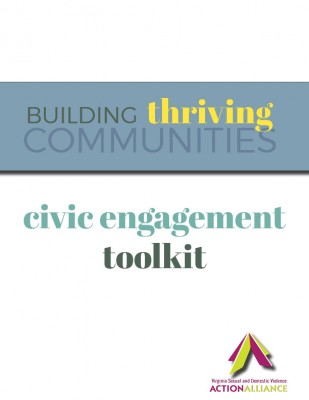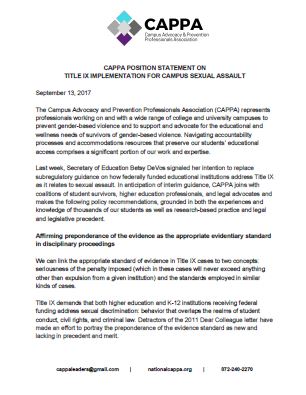Resources Library: Prevention
Start a Search:
Building Healthy Relationships Across Virginia
The Teen Dating Violence Prevention Facilitator’s Guide began its “life” in February 1996. The project benefited greatly when Cindy Katona agreed to lead the working committee. With her dedication, enthusiasm and remarkable creativity, Cindy inspired an amazing number of people to do an incredible amount of work. She also recruited vast numbers of volunteers from the Winchester area as ad-hoc members of the committee to field test and refine the curriculum. The First Edition of the guide, titled “Virginia Responds: Teens Building Violence-Free Relationships,” was published by VADV in early 1997, and was welcomed by a diverse range of professionals working with teens.
The year 2004 marked the official beginning of VSDVAA and a greater focus on primary prevention work. It was in this environment that dating violence prevention work with
teens became a priority, and VSDVAA took on the formidable task of revamping the Teen Dating Violence Prevention Facilitator’s Guide. Drawing upon the expertise and
enthusiasm of members of VTDVP Taskforce, VSDVAA staff member Brad Perry was able to obtain invaluable feedback about how the First Edition of the guide was being
used and how a subsequent edition should be modified in order to maximize functionality. Dozens of meetings and countless work hours later, a new, more streamlined
guide began to take shape with a greater focus on activities.
Building Thriving Communities Toolkit

A toolkit to help unlock the power of individuals and communities to create a world in which all of us thrive.
The Building Thriving Communities: Civic Engagement Toolkit seeks to transform Virginia communities by increasing public participation in voting for candidates who align with their values and other means of civic engagement that promotes healthy futures.
Download the entire toolkit all at once to find all of these resources (below) designed to support you in increasing community engagement with voting, the formation of public policy, and becoming active participants in democracy. Or you may download the handouts and guides separately.
The core component of the campaign is to build authentic connections between people, across differences, and around issues that make communities healthy, safe, just, and compassionate for all.
This is a long-term campaign that draws upon the strength of the movements to end domestic and sexual violence: each person having a voice that is valued and respected, sharing stories as a tool for building understanding and mobilizing action, and empowering individuals and groups to bring about change in their own lives, in communities, and in the world.
The toolkit provides educational resources on civic engagement and strategies to engage communities and candidates.
Toolkit features:
- * guide for facilitating community conversations around civic engagement;
- * questions for candidates to build trauma-informed communities and systems;
- * legislative advocacy guide;
- * voting basics handout;
- * print-ready posters to encourage voting for a #radicallyhopefulfuture;
- * print-ready handout about why voting matters.
CAPPA Position Statement On Title IX Implementation For Campus Sexual Assault

The Campus Advocacy and Prevention Professionals Association (CAPPA) represents professionals working on and with a wide range of college and university campuses to prevent gender-based violence and to support and advocate for the educational and wellness needs of survivors of gender-based violence.
Charting the Path Forward from Campus Prevention Network
In the six years since the release of the Dear Colleague Letter, and the four years since the passage of the VAWA amendments to the Clery Act, colleges and universities across the country have devoted unprecedented attention, time, and resources to preventing sexual assault on campus. EverFi’s Campus Prevention Network, in collaboration with It’s On Us, has examined the current state of sexual assault prevention to identify positive national trends in higher education and spotlight areas that schools need to continue to focus their attention. Among the findings, this report highlights:
- Nearly 50% of college presidents have spoken publicly about sexual assault three or more times in the past year; only a quarter of college presidents did not speak about sexual assault publicly in the past year;
- While fewer than a third of campuses (27.9%) reported stable, consistent funding for evaluation efforts of their prevention programming, nearly all campuses are engaging in at least one evaluation effort of their prevention programming despite funding challenges;
- Peer educators are playing an increasingly prominent role in delivering sexual assault prevention programming on campus; schools and colleges need to ensure peer educators receive appropriate supervision and training to fulfill their responsibilities successfully;
- Significant differences in funding and staffing levels for prevention exist across institutions, particularly in relation to school size; increased investment in prevention is necessary for ongoing impact and progress.
Domestic Violence Fatality Review
The Commonwealth currently has seventeen local and regional domestic violence fatality review teams. Teams are multidisciplinary, and through stakeholder participation, they review homicides, suicides, and homicide-suicide cases related to domestic violence. For more information on domestic violence fatality review in Virginia, please visit: http://www.vdh.state.va.us/medExam/dvfr/index.htm

